10 Music Reviews
by John Stacey, Dave heaton
Aesop Rock, Bazooka Tooth (Definitive Jux)
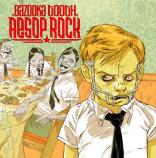 Aesop Rock's new album Bazooka Tooth has been out since September 23, but I still say you shouldn't trust any of the reviews, perhaps even this one. Why? It's too dense and enigmatic of an album for anyone to have really figured it out in less than a month. I wouldn't trust anyone who hasn't spun the album at least 50 times. Aesop Rock's fast-paced, word-heavy rhymes have an imagination to them that's obscuring more than revealing-the more you listen the more what he's saying hits you, but at first all you hear is words (interesting, captivating words). That's even truer here, on his fifth album (his second for Definitive Jux), than ever. And where the production on his last album Labor Days seemed to guide us through the songs a bit; here the production, by Aesop himself more often than not, is as thick as his rhymes and at first is just as hard to penetrate. As with some of Definitive Jux's other equally abstract urban mysteries (El-P's Fantastic Damage and Cannibal Ox's The Cold Vein, for example), the more you listen the more you'll get it. The beats start to rock, the words reveal wisdom (about the hip-hop industry, the hardships of life, about the NYC environment where Aesop's coming from), and Aesop sounds less like a puzzle, more like an MC who is miles ahead of everyone else.--dave heaton
Aesop Rock's new album Bazooka Tooth has been out since September 23, but I still say you shouldn't trust any of the reviews, perhaps even this one. Why? It's too dense and enigmatic of an album for anyone to have really figured it out in less than a month. I wouldn't trust anyone who hasn't spun the album at least 50 times. Aesop Rock's fast-paced, word-heavy rhymes have an imagination to them that's obscuring more than revealing-the more you listen the more what he's saying hits you, but at first all you hear is words (interesting, captivating words). That's even truer here, on his fifth album (his second for Definitive Jux), than ever. And where the production on his last album Labor Days seemed to guide us through the songs a bit; here the production, by Aesop himself more often than not, is as thick as his rhymes and at first is just as hard to penetrate. As with some of Definitive Jux's other equally abstract urban mysteries (El-P's Fantastic Damage and Cannibal Ox's The Cold Vein, for example), the more you listen the more you'll get it. The beats start to rock, the words reveal wisdom (about the hip-hop industry, the hardships of life, about the NYC environment where Aesop's coming from), and Aesop sounds less like a puzzle, more like an MC who is miles ahead of everyone else.--dave heaton
Belleville Rendezvous: Original Soundtrack (Labels)
Film soundtracks are notoriously difficult to review; mainly because they usually exist as a continuous movement, broken into many pieces that are at once similar but distinctly different. While a 50-second segment of music might seem appropriate while enjoying the movie on the back seat of your local multiplex, heard on a mini-system in your bedroom the score often fails to have the same effect. However, a couple of years ago I was enraptured by the beautiful film, Amelie, and its equally wonderful soundtrack. So I was drawn, perhaps illogically, to the music to the animated film Belleville Rendez-vous, composed by Ben Charest, the acclaimed Canadian jazz guitarist. What Charest has done is dip into an era of music that has passed many of us by - the twenties, an era of smoky jazz clubs, Django Reinhardt and Stephane Grappelli, of gangsters and molls and art deco. This is not rock music, but it does have a certain drive to it; Charest has welded together disparate emotional elements - some amusing, some disturbing and all evocative - to produce music that can be heard without the benefit of watching the film. Belleville Rendezvous has already been described as one of the funniest films currently doing the rounds and Charvez's soundtrack is perfectly complimentary. But don't expect rock music. Or even folk, for that matter. Not even jazz. This is unique stuff that gladdens the heart and brings a smile to your face.--John Stacey
Marshall Crenshaw, What's In The Bag? (Razor and Tie)/(Evangeline)
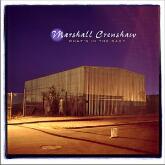 Right from the opening track, "Will We Ever?", you realise that this is something special. Its plangent pedal steel guitar perfectly suits this quietly reflective country song and begins the album in fine style. After the second track "Where Home Used To Be," with its sawing cello and James Taylor like ambience, you're grinning from ear to ear - at least I was, anyway. I must admit I'd not heard much of Crenshaw's stuff in recent years since eagerly snapping up his debut in 1982. Apart from a couple of instumentals - "Despite The Sun," a sort of bluesy stomper, and "AKA A Big Heavy Hot Dog," a bit of a jazzy guitar excursion - this is mainly Crenshaw in full on singer-songwriter mode, in which he raids fifties rock and roll, the Beatles and R&B and even has the nerve to record a Prince song ("Take Me With U") and make it an instant power pop classic. Why this guy has not got his portrait in the Rock And Roll Hall Of Fame I don't know, but he deserves to with this release. If you like songs you will find yourself humming in your sleep, well played and produced, What's In The Bag is for you. What's In The Bag? Something great. Thanks, Marshall. Bring along the next on - and make it quick.--John Stacey
Right from the opening track, "Will We Ever?", you realise that this is something special. Its plangent pedal steel guitar perfectly suits this quietly reflective country song and begins the album in fine style. After the second track "Where Home Used To Be," with its sawing cello and James Taylor like ambience, you're grinning from ear to ear - at least I was, anyway. I must admit I'd not heard much of Crenshaw's stuff in recent years since eagerly snapping up his debut in 1982. Apart from a couple of instumentals - "Despite The Sun," a sort of bluesy stomper, and "AKA A Big Heavy Hot Dog," a bit of a jazzy guitar excursion - this is mainly Crenshaw in full on singer-songwriter mode, in which he raids fifties rock and roll, the Beatles and R&B and even has the nerve to record a Prince song ("Take Me With U") and make it an instant power pop classic. Why this guy has not got his portrait in the Rock And Roll Hall Of Fame I don't know, but he deserves to with this release. If you like songs you will find yourself humming in your sleep, well played and produced, What's In The Bag is for you. What's In The Bag? Something great. Thanks, Marshall. Bring along the next on - and make it quick.--John Stacey
Danielson Famile, Fetch The Compass, Kids (Secretly Canadian)
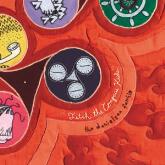 Back in 1968, Frank Zappa created a kaleidoscopic, psychedelic sound that swirled an danced and cavorted before your ears. It was if the Mothers Of Invention had created a lunatics' asylum of music that was the aural equivalent of drinking a bottle of Bushmills whiskey in one go; great at the time but beware the hangover. I have listened to this album several times and still cannot get a handle on what it's all about - one minute I feel like it is being performed in a circus big top; the next Danielson Famile is a surreal Victorian vaudeville troupe producing bizarre music that makes me think of dolls houses and dogs in bow ties doing tricks and magic lanterns etc al. Then, just when my mind is doing mental cartwheels at the incongruousness of all this, a sublimely beautiful melody passes by, like a butterfly caught in an electric storm. Key to all this is the falsetto voice of eldest son Daniel Smith - they're called Smith, not Danielson, to add to the mystery - whose piercing, high-pitched voice dominates the collection of banjos, flutes, bells and conventional instruments through 12 tracks with titles like "Good News For The Pus Pickers," "Can we Camp At Your Feet" and "Fathom The Nine Fruits Pie." Idiosyncratic, oddball, awkward, funny, frightening, disturbing...there aren't enough adjectives to adequately describe Danielson Famile. If you like music that is left-field, individual and not afraid to ask a few questions, this is for you.--John Stacey
Back in 1968, Frank Zappa created a kaleidoscopic, psychedelic sound that swirled an danced and cavorted before your ears. It was if the Mothers Of Invention had created a lunatics' asylum of music that was the aural equivalent of drinking a bottle of Bushmills whiskey in one go; great at the time but beware the hangover. I have listened to this album several times and still cannot get a handle on what it's all about - one minute I feel like it is being performed in a circus big top; the next Danielson Famile is a surreal Victorian vaudeville troupe producing bizarre music that makes me think of dolls houses and dogs in bow ties doing tricks and magic lanterns etc al. Then, just when my mind is doing mental cartwheels at the incongruousness of all this, a sublimely beautiful melody passes by, like a butterfly caught in an electric storm. Key to all this is the falsetto voice of eldest son Daniel Smith - they're called Smith, not Danielson, to add to the mystery - whose piercing, high-pitched voice dominates the collection of banjos, flutes, bells and conventional instruments through 12 tracks with titles like "Good News For The Pus Pickers," "Can we Camp At Your Feet" and "Fathom The Nine Fruits Pie." Idiosyncratic, oddball, awkward, funny, frightening, disturbing...there aren't enough adjectives to adequately describe Danielson Famile. If you like music that is left-field, individual and not afraid to ask a few questions, this is for you.--John Stacey
Giardini di Miro, Punk...Not Diet (Homesleep)
Prog rock's not dead, it's alive and well and living in Italy. That excellent label Homesleep, makers of a fine album by Yuppie Flu, released earlier this year, have come up trumps again with another fine offering. Punk...Not Diet (I think you have to be Italian to understand) creates epic, orchestral soundscapes not dissimilar to the kind of stuff Talk Talk were doing years ago. However, those with longer memories might recall fellow-Italians PFM, who were giants of the prog rock stage in the seventies. Giardini di Miro's sound nods in their directly, whether directly or subliminally, while at the same time using UK bands like Pink Floyd as their template, especially on the track "When You Were A Postcard." Don't expect giant music - in many ways Giardini di Miro have produced a quiet, reflective sound that swells to enormity. But it's a restrained enormity, one that jettisons the bombast of old. This isn't retro stuff; far from it. The use of technology and all its tricks roots Punk...Not Diet firmly in the 21st century.--John Stacey
Hamell On Trial, Tough Love (Righteous Babe)
 And tough certainly is the word. As is uncompromising; passionate; loud; angry; garrulous. Described elsewhere as 'Billy Bragg with a bad attitude' New Yorker Ed Hamell batters his acoustic guitar until his fingers bleed on 16 songs that tackle anything and everything that Hamell deems fitting to vent his spleen on. You could call it folk-punk; you could take it very seriously, but it's hard not to laugh at the intense earnestness of it all as Hamell rails about sex, love, politics, religion, drugs - basically having a go - and in very literate terms - at the 21st century. Record reviewers and magazine are not spared his vitriol, either, as he scythes into the likes of Rolling Stone and other 'corny music magazines' that are an excuse to sell 'fashion or bullshit.' On the subjects of hospital medication, Hamell's chorus on "Downs"--'Downs, morphine, secanol, percodan, codeine. Pleasure seeing you around'--pokes fun at the whole pill-popping hopelessness of it all. The music is not all anger, though; Hail is gossamer pretty and allows a little chink of light into the darkness. Hamell mostly plays all instruments but when he is assisted by the likes of Gary Lucas, Ernie Brooks and Ani DiFranco, the band really rocks. A sympathetic production by veteran John Leckie lets the songs shine through while still harnessing the raw power inherent in each track. Challenging, at times raw and upsetting, Ed Hamell has produced a wake-up call.--John Stacey
And tough certainly is the word. As is uncompromising; passionate; loud; angry; garrulous. Described elsewhere as 'Billy Bragg with a bad attitude' New Yorker Ed Hamell batters his acoustic guitar until his fingers bleed on 16 songs that tackle anything and everything that Hamell deems fitting to vent his spleen on. You could call it folk-punk; you could take it very seriously, but it's hard not to laugh at the intense earnestness of it all as Hamell rails about sex, love, politics, religion, drugs - basically having a go - and in very literate terms - at the 21st century. Record reviewers and magazine are not spared his vitriol, either, as he scythes into the likes of Rolling Stone and other 'corny music magazines' that are an excuse to sell 'fashion or bullshit.' On the subjects of hospital medication, Hamell's chorus on "Downs"--'Downs, morphine, secanol, percodan, codeine. Pleasure seeing you around'--pokes fun at the whole pill-popping hopelessness of it all. The music is not all anger, though; Hail is gossamer pretty and allows a little chink of light into the darkness. Hamell mostly plays all instruments but when he is assisted by the likes of Gary Lucas, Ernie Brooks and Ani DiFranco, the band really rocks. A sympathetic production by veteran John Leckie lets the songs shine through while still harnessing the raw power inherent in each track. Challenging, at times raw and upsetting, Ed Hamell has produced a wake-up call.--John Stacey
Damien Jurado, Where Shall You Take Me? (Secretly Canadian)
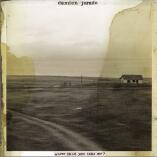 I'll come straight to the point. This is a beautiful album, one that should be cherished by anyone who likes music with heart and integrity. His fifth full-length album, this is a lovely collection of (mainly) ballads about Middle America, territory occupied for some time by the likes of Springsteen and Mellencamp. Durado's 'band' of Eric Fisher (guitar/keyboards), Andy Myers (percussion) and Josh Golden (bass) has created a mostly acoustic set of songs that often barely raise themselves from the horizontal. Now and again the likes of Rosie Thomas help out on vocals and there is the odd additional piano or violin to add discreet texture, but Where Shall You Take Me? Is a slow-burning, gentle affair that looks at Middle America's quirks and characters with songs that seem to gain inspiration from deep south spirituals and early American folk. Many have described how Jurado occupies the same intellectual space as the likes of Ron Sexsmith or the late, great Phil Ochs, which might be true, but in many of these songs I sense a touch of Neil Young's eerie melancholy; a loneliness that is accentuated by the spartan arrangements. Damien Jurado is taking us on a journey into the past; a past that he knows well. I am interested to see where he will go in future.--John Stacey
I'll come straight to the point. This is a beautiful album, one that should be cherished by anyone who likes music with heart and integrity. His fifth full-length album, this is a lovely collection of (mainly) ballads about Middle America, territory occupied for some time by the likes of Springsteen and Mellencamp. Durado's 'band' of Eric Fisher (guitar/keyboards), Andy Myers (percussion) and Josh Golden (bass) has created a mostly acoustic set of songs that often barely raise themselves from the horizontal. Now and again the likes of Rosie Thomas help out on vocals and there is the odd additional piano or violin to add discreet texture, but Where Shall You Take Me? Is a slow-burning, gentle affair that looks at Middle America's quirks and characters with songs that seem to gain inspiration from deep south spirituals and early American folk. Many have described how Jurado occupies the same intellectual space as the likes of Ron Sexsmith or the late, great Phil Ochs, which might be true, but in many of these songs I sense a touch of Neil Young's eerie melancholy; a loneliness that is accentuated by the spartan arrangements. Damien Jurado is taking us on a journey into the past; a past that he knows well. I am interested to see where he will go in future.--John Stacey
Looper, MP3 EP #1 (self-released)
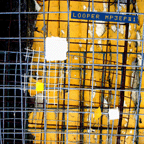 "God help me/she's the strangest girl I ever did see," Stuart David sings on "The Strangest Girl," the first song on MP3 EP #1, the first in a series of EPs Looper is offering for free through their web site. It's a sweet and melodic love song about observing and appreciating, even if you don't understand, the weird quirks of other people. Love between weirdos-and we're all weirdos-is a persistent theme in Looper's music, and "The Strangest Girl" is another pleasant continutation of it. Really, all three songs on this EP can be described like that, as enjoyable continuations of what Looper's been doing over the course of their three albums. Musically the sound of the EP is most like that of their most recent two albums The Snare and The Geometrid, meaning the songs have a full, very electronic sound. After "The Strangest Girl"-the outright pop song of the bunch-there's a very Geometrid-like instrumental called "Play the One I Like." And the EP is rounded out by "The Spider Man," where pretty but ominous keyboards support one of David's spoken stories, this time about the weird things you start to notice about your behavior. Overall, the EP's a nice gift from a group that always produces interesting sounds and ideas.--dave heaton
"God help me/she's the strangest girl I ever did see," Stuart David sings on "The Strangest Girl," the first song on MP3 EP #1, the first in a series of EPs Looper is offering for free through their web site. It's a sweet and melodic love song about observing and appreciating, even if you don't understand, the weird quirks of other people. Love between weirdos-and we're all weirdos-is a persistent theme in Looper's music, and "The Strangest Girl" is another pleasant continutation of it. Really, all three songs on this EP can be described like that, as enjoyable continuations of what Looper's been doing over the course of their three albums. Musically the sound of the EP is most like that of their most recent two albums The Snare and The Geometrid, meaning the songs have a full, very electronic sound. After "The Strangest Girl"-the outright pop song of the bunch-there's a very Geometrid-like instrumental called "Play the One I Like." And the EP is rounded out by "The Spider Man," where pretty but ominous keyboards support one of David's spoken stories, this time about the weird things you start to notice about your behavior. Overall, the EP's a nice gift from a group that always produces interesting sounds and ideas.--dave heaton
My Morning Jacket, It Still Moves (ATO/RCA)
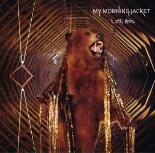 Until It Still Moves, you'd be forgiven for thinking of My Morning Jacket as a fantastic singer and songwriter-Jim James-backed by a bunch of other guys. But anyone introduced to MMJ during the relentless touring they've done since their last album At Dawn knows that they're a band, and a tight-as-hell band that wants to knock you over with their ability to rock at that. The group's first two albums The Tennessee Fire and At Dawn mixed a country-ish classic rock sound with the feeling of watching the most beautiful sunset out in the middle of nowhere. Their live show manages to amp up the rock factor in a way that still gets across how great the group's songs are, how beautiful the melodies and evocative the impressionistic lyrics are. It Still Moves is the obvious product of that band that kicked your ass when you saw them live. The first two songs, "Mahgeetah" and "Dancefloors," make that immediately clear, with the group fiercely banging away at the song. The first track even ends with a standard rock-show ending (the drawn-out ending), while the second finds them jamming away with the help of a horn section. It Still Moves has the same qualities that made their other albums so great, plus a little more strength and a bit less atmosphere. If it doesn't glow as much as At Dawn did, the guitars sear into you more and James' haunting voice still has the ability to pierce right through you.--dave heaton
Until It Still Moves, you'd be forgiven for thinking of My Morning Jacket as a fantastic singer and songwriter-Jim James-backed by a bunch of other guys. But anyone introduced to MMJ during the relentless touring they've done since their last album At Dawn knows that they're a band, and a tight-as-hell band that wants to knock you over with their ability to rock at that. The group's first two albums The Tennessee Fire and At Dawn mixed a country-ish classic rock sound with the feeling of watching the most beautiful sunset out in the middle of nowhere. Their live show manages to amp up the rock factor in a way that still gets across how great the group's songs are, how beautiful the melodies and evocative the impressionistic lyrics are. It Still Moves is the obvious product of that band that kicked your ass when you saw them live. The first two songs, "Mahgeetah" and "Dancefloors," make that immediately clear, with the group fiercely banging away at the song. The first track even ends with a standard rock-show ending (the drawn-out ending), while the second finds them jamming away with the help of a horn section. It Still Moves has the same qualities that made their other albums so great, plus a little more strength and a bit less atmosphere. If it doesn't glow as much as At Dawn did, the guitars sear into you more and James' haunting voice still has the ability to pierce right through you.--dave heaton
The Ramblin' Ambassadors, Avanti (Mint Records)
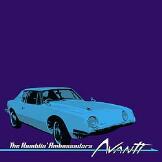 The loud guitar sound that echoes out of your speakers as The Ramblin' Ambassadors' Avanti starts is a familiar one to fans of Dick Dale, The Ventures, or any of their surf-rock legion. Yet the song it's kick-starting isn't taking you to the beach, it's taking you to the old West; it's a cover of Ennio Morricone's "Sixty Seconds to What?", from For a Few Dollars More. Throughout Avanti The Ramblin' Ambassadors take a reved-up, old-fashioned rockabilly approach to movie theme songs. Actually only that first track is from a real movie: the others are from the Spaghetti Westerns of their dreams. With titles like "Hangin' Tree" and "Theme From 'The Ramblin' Bastards'", these songs feel like they must have been in some movie that you watched on TV late one night. Song after song is big, stylish, and firmly in a certain instrumental-rock tradition. Avanti is nothing especially unique, but is an album that sounds great and furthers a grand tradition of American music.--dave heaton
The loud guitar sound that echoes out of your speakers as The Ramblin' Ambassadors' Avanti starts is a familiar one to fans of Dick Dale, The Ventures, or any of their surf-rock legion. Yet the song it's kick-starting isn't taking you to the beach, it's taking you to the old West; it's a cover of Ennio Morricone's "Sixty Seconds to What?", from For a Few Dollars More. Throughout Avanti The Ramblin' Ambassadors take a reved-up, old-fashioned rockabilly approach to movie theme songs. Actually only that first track is from a real movie: the others are from the Spaghetti Westerns of their dreams. With titles like "Hangin' Tree" and "Theme From 'The Ramblin' Bastards'", these songs feel like they must have been in some movie that you watched on TV late one night. Song after song is big, stylish, and firmly in a certain instrumental-rock tradition. Avanti is nothing especially unique, but is an album that sounds great and furthers a grand tradition of American music.--dave heaton
Copyright (c) 2005 erasing clouds |
|